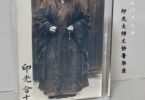缺乏善根的少年
印光大师三十一岁的时候,在北京圆广寺挂单,有一天他跟一位法师到寺院附近散步,看见一个年约十五、六岁的少年,在路上行乞。这位少年看见了他们,就走过来向印光大师说:『师父行行好!布施我一点钱吧!』『你念一句’南无南无阿弥陀佛’,我就给你一文钱。』大师说。少年瞪大眼睛看著大师,不念!大师看到这个情形,又告诉他:『你念十句“南无南无阿弥陀佛”我就给你十文钱。』少年目瞪口呆,用难以置信的表情看著大师,仍然不念。
于是大师将身上所有的钱都掏出来,大概有四百多文钱。他再次对少年说:『你念一句佛号,我就给你一文钱。你尽管一直念下去,直到这袋钱都给了你为止。』少年听到大师这么说,突然大哭起来,因为他非常想要钱,却仍然不肯念佛。大师体会到一句佛号要从缺乏善根的孩子口中念出来,竟然是那麽地困难,他摇摇头,叹了一口气:『唉!这孩子实在太缺乏善根了。』大师从钱袋里拿出一文钱,给了这位少年,然后就回去了。
– 释见文编述; 原文见《永思集: 印光大师轶事》
The Youth Who Lacked Good Roots
When Master Yinguang (印光大师: the 13th Patriarch of the Chinese Pure Land tradition: 1861-1941) was in his early thirties, he was staying at Beijing’s Yuan Guang Monastery. One day, he took a stroll with a Venerable outside the monastery nearby. He saw a youngster of about 15 to 16 years of age begging on the street. When the teenager saw them, he approached Master Yinguang and pleaded, ‘Master, please do some good! Please give me some money!’
Master Yinguang replied, ‘If you chant “Namo Amituofo” (南无阿弥陀佛: Homage to / Refuge in Amitabha Buddha) once, I will give you one coin (1 文钱: about 0.2 yuan).’ The teen stared at Master Yinguang with his eyes wide open, but would not utter a word! Seeing the situation, Master Yinguang told him, ‘If you chant ‘Namo Amituofo’ ten times, I will give you ten coins (about 2 yuan).’ The teen was bewildered, and continued to stare at Master Yinguang in disbelief and silence.
Master Yinguang then dug out all the money he was carrying, which amounted to about 400 coins (about 80 yuan or SGD $16.75), and said to the teen, ‘If you chant Amituofo’s name once, I will give you one coin. You can chant continuously, till all the money in this bag is yours.’ Hearing this, the teen suddenly burst into tears, because though he very much wanted the money, he was still unwilling to say Amituofo’s name.
Master Yinguang realised how very difficult it was to urge this teen who lacked good roots to chant the Buddha’s name just once. He shook his head and sighed, ‘Alas! This child really lacks good roots.’ Nevertheless, Master Yinguang took a coin from the bag and gave it to him, before returning. (Please see notes below.)
Notes:
- The Amitabha Sutra (阿弥陀经) teaches that ‘不可以少善根福德因缘得生彼国’ – which means that ‘One cannot be lacking in good roots (善根) and blessed virtues (福德) as cause and conditions (因缘) to be born in that land [Amituofo’s Pure Land].’ Similarly, one who lacks these factors face obstacles in practising mindfulness of Amituofo. The fact that one can practise properly means one has met the above criteria, though the quality of one’s practice depends on one’s diligence. The practice of mindfulness of Amituofo’s name itself increases good roots and blessed virtues too._
_ - Though we might personally think that Amituofo’s name is easy to chant, it is not easy to encourage everyone to chant Amituofo’s name even just once. Some, upon hearing his name, are joyous, while some might be indifferent or even feel aversion. These different responses are due to differences in good roots (善根) and blessed virtues (福德). If one lacks them, even if a great master (e.g. Master Yinguang, who was a manifestation of Mahastamaprapta Bodhisattva: 大势至菩萨) with compassionate skilful means might be unable to successfully urge one to chant Amituofo – especially when one is also egoistic, stubborn or dull._
_ - Master Ouyi (澫益大师: the 9th Patriarch of the Chinese Pure Land tradition: 1898-1655) taught this – ‘Only if you have faith (信) and vows (愿) and recite the Buddha’s name will each and every repetition of the Buddha’s name be amply supplied with good roots (善根) and blessed virtues (福德). Even if you invoke the Buddha’s name in a scattered state of mind, the blessd virtues and good roots are still incalculable – how much more so when you invoke the Buddha’s name wholeheartedly without being scattered (一心不乱).’ This means that though we need good roots and blessed virtues to want to be mindful of Amituofo (念佛), mindfulness of Amituofo (念佛) itself is also a means to accumulate good roots and blessed virtues.
_ - As the teen lacked good roots (善根), he was resistant to chanting Amituofo’s name. He also lacked blessed virtues (福德), which is why he was poor. However, he had the cause and conditions (因缘) to meet a great teacher to introduce him to Amituofo. However, the teen lacked the wisdom to ask for the Dharma, and begged only for money. Though he asked Master Yinguang to ‘do good’ by giving him money, the Master offered him both money and something greater – opportunities to deepen his good roots (善根) and increase his blessed virtues (福德). Sadly, he missed these opportunities and chose to suffer due to his craving and delusion instead. Even when the treasure of the Dharma was presented before him by a great teacher, he failed to appreciate it. This was so as he was overly materially-inclined; and not at all spiritually inclined, seeing worth in terms of money only. His attachment and probable miserliness over money might be the karmic causes of his present poverty. Even when lured by relatively a lot of money, he could not bridge the chasm between materialism and spirituality. It is not that the teen did not have any good roots at all, but that he did not have enough then.
_ - Although the teen did not chant even once, in his largely one-way conversation, Master Yinguang ensured that the teen heard the name of Amituofo several times, which would create positive imprints in his mind. In time to come, when conditions ripen, the teen’s good roots (善根) can grow – especially if he recalls the kindness of the Master connected to the name of Amituofo. We too can use Master Yinguang’s method to urge some to chant Amituofo’s name.
_ - Similar to the teen, when we are reluctant to practise mindfulness of Amituofo’s name, we too are lacking good roots (善根) in the moment. When we assume it is easy to chant Amituofo and hence do not practise, we are somewhat similar too.
_ - On a related note, when Master Shaokang (少康大师: the 5th Patriarch of the Chinese Pure Land tradition: 770-805) came to Muzhou, he took his collected donations and converted them into small coins. Whenever he met children on the streets, he would urge them to chant Amituofo’s name, giving them a coin for each chant. Very soon, he became short of money, and exchanged ten chants of Buddha’s name for a coin instead. A year later, within Muzhou, regardless of the young or old, noble or lowly, rich or poor, whenever anyone met Master Shaokang, they would greet him with ‘Amituofo’. Very soon, the sound of Amituofo’s name pervaded Yingpu.
_ - Every time the Buddha’s name was chanted by Master Shaokang, a shimmering golden image of Amituofo would float out of his mouth. With ten chants came ten Amituofo images, resembling an uninterrupted string of mala (prayer beads). Thus, he became known as ‘The Later Shaodao (后善导)’, as Master Shandao (善导大师: the 2nd Patriarch of the Chinese Pure Land tradition: 613-681, who is regarded as a manifestation of Amituofo) manifested similar miracles, of projecting golden light from his mouth when chanting Amituofo’s name, to inspire the masses on the practice of Buddha mindfulness.





